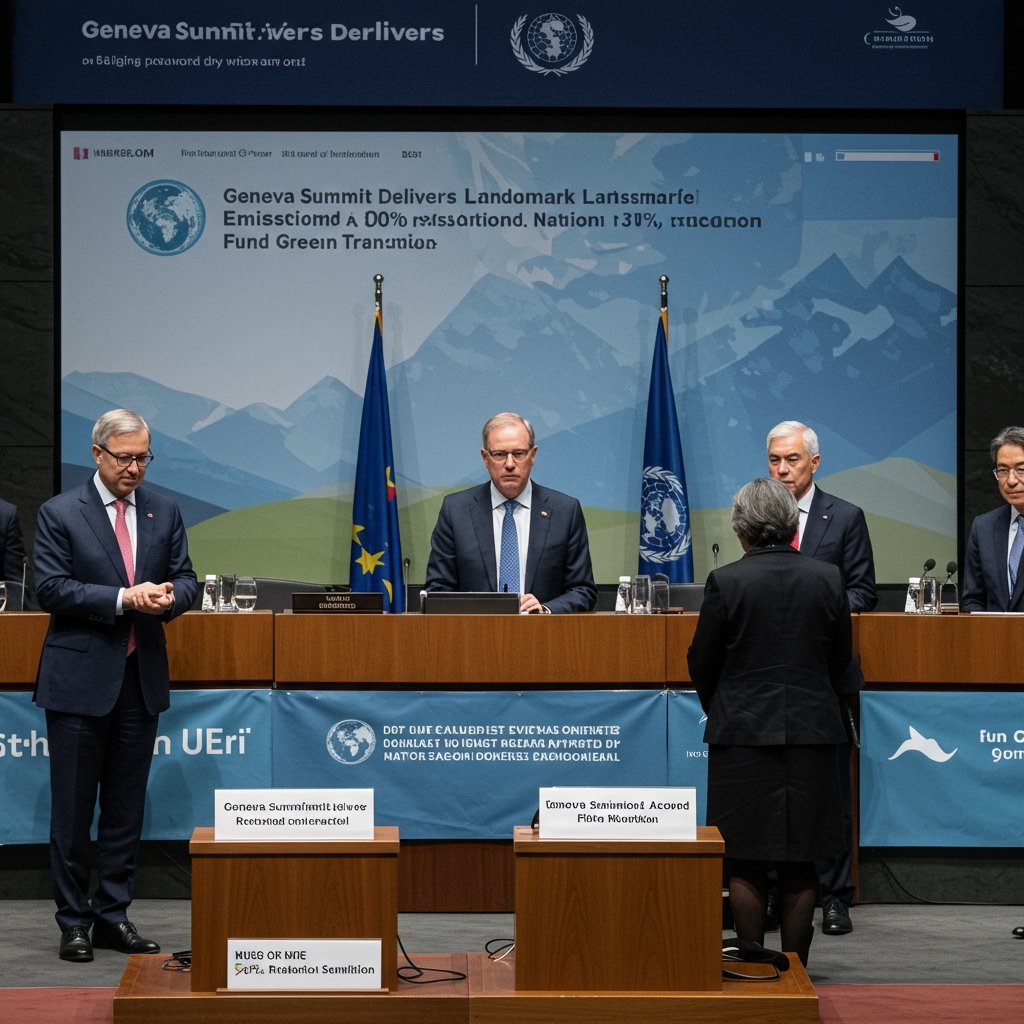Historic Global Sustainability Summit in Geneva Concludes with Landmark Climate Action Framework
Geneva, Switzerland – In a pivotal moment for international climate action, leaders from over 150 nations converged in Geneva, culminating in the successful conclusion of the Global Sustainability Summit on May 25th. The summit’s most significant achievement is the signing of a landmark agreement aimed at dramatically accelerating global efforts to combat climate change. This accord, officially titled the “Geneva Climate Action Framework”, represents a substantial step forward, securing commitments that many hope will realign the world onto a path towards a more sustainable future.
The Framework, endorsed by a vast majority of the participating countries including major economic powers such as the United States, China, and the European Union, lays out ambitious targets and concrete mechanisms designed to drive down global greenhouse gas emissions. At the core of the agreement is a binding commitment for signatory nations to collectively reduce their greenhouse gas emissions by 30% from 2020 levels by the year 2035. This specific, time-bound target provides a clear benchmark for progress and underscores the urgency felt by world leaders in addressing the escalating environmental crisis.
Crucially, the Geneva Climate Action Framework addresses key financial and implementation challenges that have hampered previous international climate efforts. A cornerstone of the agreement is the establishment of a substantial $500 billion Green Climate Fund. This fund is specifically earmarked to provide much-needed financial and technological support to developing nations, facilitating their transition away from fossil fuels and towards cleaner, renewable energy sources. The recognition that a global energy transition requires equitable support for nations with varying economic capacities was a key driver behind the fund’s creation and substantial capitalization.
Beyond funding, the agreement also incorporates robust and innovative verification and enforcement mechanisms. These mechanisms are designed to ensure transparency, accountability, and compliance among signatory nations. They represent a direct response to obstacles that have significantly stalled negotiations for years, particularly concerns around monitoring countries’ progress and ensuring commitments are met. While specific details of these mechanisms will be further elaborated in subsequent protocols, the Framework establishes a framework for independent monitoring, regular reporting requirements, and a process for addressing non-compliance, moving beyond voluntary or less stringent accountability measures seen in earlier climate pacts.
Overcoming Obstacles: A Breakthrough in International Cooperation
The path to the Geneva Climate Action Framework was not without significant challenges. Negotiations leading up to the Global Sustainability Summit had faced considerable hurdles, primarily centered on the level of ambition for emissions reductions, the scale and source of climate finance for developing countries, and the design of effective compliance mechanisms. The breakthrough in Geneva demonstrates a renewed willingness among major global players to compromise and find common ground in the face of a shared existential threat.
Sources close to the negotiations indicated that intense diplomatic efforts in the weeks preceding the summit, coupled with a growing scientific consensus on the accelerating impacts of climate change, helped build momentum. The inclusion of both the United States and China, the world’s two largest emitters, alongside the collective commitment of the European Union, sends a powerful signal of unified intent, vital for any meaningful global climate action. Their engagement was seen as indispensable to reaching an agreement of this magnitude.
The $500 billion Green Climate Fund is intended to mobilize financial resources from developed countries and potentially other sources, including international financial institutions and private sector contributions, though the specifics of burden-sharing among contributing nations will be a subject of ongoing discussions. The fund’s mandate extends beyond simply providing capital; it aims to support capacity building, technology transfer, and the development of sustainable infrastructure in vulnerable countries, enabling them to simultaneously pursue economic development and climate resilience.
The robust verification and enforcement mechanisms detailed within the Geneva Climate Action Framework include provisions for regular international reviews of national emissions inventories and climate action plans. The intent is to create a transparent system where the progress, or lack thereof, of each signatory is openly assessed. While the precise nature of enforcement consequences for non-compliance remains to be fully defined, the establishment of these mechanisms within the core agreement signifies a move towards a more binding and accountable international climate regime.
Significance and the Path Forward
The successful adoption of the Geneva Climate Action Framework is widely regarded as the most significant international pact on climate change since the Paris Agreement of 2015. While the Paris Agreement established a framework for countries to set their own nationally determined contributions (NDCs) and aimed to keep global warming well below 2 degrees Celsius, pursuing efforts to limit it to 1.5 degrees, the Geneva Framework introduces a specific collective, near-term target (30% reduction by 2035) and a significantly capitalized global fund with enhanced accountability measures.
Analysts suggest that the Framework signals a renewed and intensified global commitment to combating the environmental crisis. It recognizes that the current trajectory of emissions is insufficient to meet long-term climate goals and that accelerated action is imperative within the next decade. The focus on reducing emissions by 30% from 2020 levels by 2035 provides a critical interim milestone on the path to achieving net-zero emissions later in the century.
Implementing the Geneva Climate Action Framework will require unprecedented cooperation and transformative policy shifts within signatory nations. The $500 billion Green Climate Fund will need to be efficiently managed and deployed to maximize its impact in fostering sustainable development and energy transitions in the Global South. The verification and enforcement mechanisms will need to be operationalized in a way that is effective, fair, and maintains the trust of all parties.
The successful outcome in Geneva provides a surge of optimism for the future of international climate diplomacy. It demonstrates that despite geopolitical complexities, nations can unite around a common purpose when faced with a crisis of this magnitude. The focus now shifts from negotiation to implementation, requiring sustained political will, significant investment, and global collaboration to turn the ambitious targets and mechanisms of the Geneva Climate Action Framework into tangible reductions in greenhouse gas emissions and a more sustainable future for all.






